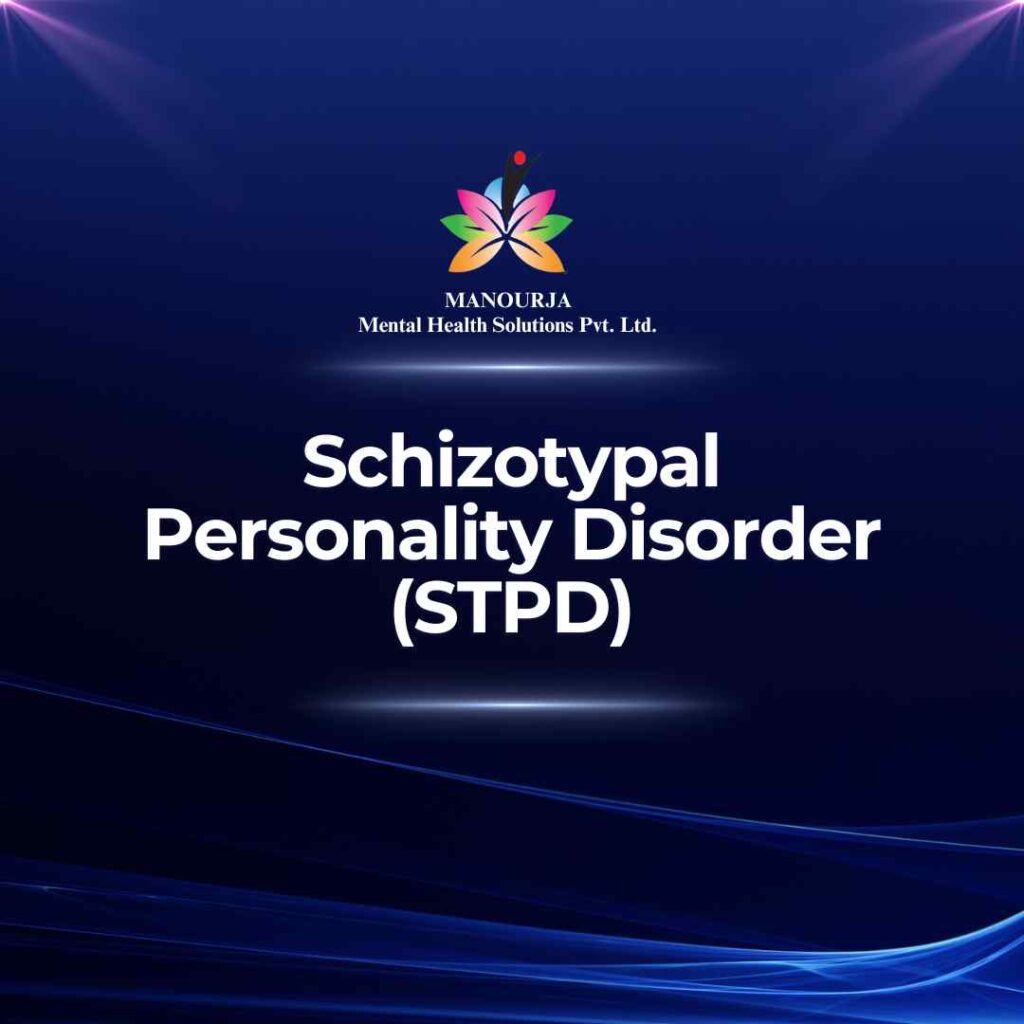Schizotypal Personality Disorder (STPD)

Schizotypal Personality Disorder (STPD) is a mental health condition characterized by severe social anxiety, thought disorder, paranoid ideation, derealization, transient psychosis, and often unconventional beliefs. STPD is classified under Cluster A of personality disorders, known for their odd or eccentric features. This condition is seen as part of the “schizophrenia spectrum” due to its symptoms and genetic links to schizophrenia.
Symptoms of Schizotypal Personality Disorder
Individuals with Schizotypal Personality Disorder exhibit a range of symptoms that significantly impact their ability to function socially and maintain relationships. Key characteristics include:
- Ideas of Reference: Interpreting random events as having a particular and unusual meaning specifically for the person.
- Odd Beliefs or Magical Thinking: Believing in clairvoyance, telepathy, or “sixth sense”; in children and teens, bizarre fantasies or preoccupations.
- Unusual Perceptual Experiences: Odd sensations or perceived alterations in the external environment that are not apparent to others.
- Odd Thinking and Speech: Vague, circumstantial, metaphorical, overelaborate, or stereotyped speech patterns.
- Suspiciousness or Paranoid Ideation: Being overly suspicious or feeling paranoid about others’ intentions without sufficient basis.
- Inappropriate or Constricted Affect: Showing an emotional response that’s perceived as detached, cold, or inappropriate to the context.
- Behavior or Appearance That is Odd, Eccentric, or Peculiar: Demonstrating behavior or dressing in ways that are seen as strange or unconventional.
- Lack of Close Friends or Confidants: Having few, if any, close relationships outside of one’s immediate family due to intense discomfort with social interactions.
- Excessive Social Anxiety: Feeling intensely uneasy around others, which does not diminish with familiarity and is often associated with paranoid fears rather than negative judgments about self.
Forms of Schizotypal Personality Disorder
Schizotypal traits can vary widely from one individual to another. Some may primarily exhibit eccentric behavior and beliefs but manage daily functions relatively well, while others might experience more severe symptoms like transient hallucinations and significant social isolation that gravely impair functioning.
Treatment of Schizotypal Personality Disorder
Treating STPD can be challenging due to the intrinsic lack of trust and the bizarre nature of some of the individual’s beliefs and perceptions. However, treatment strategies can include:
Psychotherapy:
- Cognitive-Behavioral Therapy (CBT): Helps to address distorted thinking and reduce symptoms. CBT can be modified to help the person recognize and alter unusual beliefs and thoughts.
- Psychodynamic Therapy: Explores underlying unconscious conflicts and past experiences that contribute to the current symptoms.
- Supportive Therapy: Provides encouragement and boosts coping mechanisms. This approach may help improve social skills and communication.
Medications:
- While there are no medications specifically approved for STPD, antipsychotic drugs can be helpful in reducing symptoms like paranoia and transient psychosis.
- Antidepressants might be used if the person also suffers from significant depression.
Social Skills Training:
- Structured training sessions to enhance social competence and reduce social anxieties.
Community Therapy:
- Involvement in community activities can help improve social interactions and reduce feelings of isolation.
Conclusion
STPD is a complex personality disorder that significantly impacts an individual’s social interactions and cognitive processes. Treatment typically involves a combination of psychotherapy and medications aimed at managing the more debilitating symptoms of the disorder and improving the person’s quality of life. Engaging the individual in treatment can be challenging due to their symptoms, so building a therapeutic relationship based on trust and understanding is crucial.
At MANOURJA, we believe in the transformative power of counseling. Our experienced therapists offer a safe and supportive space where you can explore your thoughts, emotions, and challenges. Through personalized counselling sessions, we’ll work together to develop coping strategies, build resilience, and achieve lasting positive change. Discover the path to a healthier, happier you with MANOURJA counselling services.
MANOURJA Rehabilitation Services
At MANOURJA, we’re dedicated to helping you in rebuild your life, after difficult times. Our rehabilitation services focus on understanding what you need to move forward, whether you’re recovering from addiction, trauma, or any psychological – social challenges. We create personalized plans, that are all about helping you, regain your strength and find hope again. With a caring team by your side, you’ll have the support to make real progress and take steps toward a brighter, healthier future
